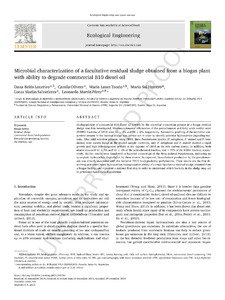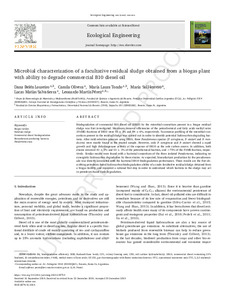Por favor, use este identificador para citar o enlazar este ítem:
https://repositorio.uca.edu.ar/handle/123456789/10089| Título: | Microbial characterization of a facultative residual sludge obtained from a biogas plant with ability to degrade commercial B10 diesel oil | Autor: | Loureiro, Dana Belén Olivera, Camila Tondo, María Laura Herrero, María Sol Salvatierra, Lucas Matías Pérez, Leonardo Martín |
Palabras clave: | BIODEGRADACION; DIESEL; HIDROCARBUROS; BIOGAS | Fecha de publicación: | 2020 | Editorial: | Elsevier | Cita: | Loureiro, D. B. Microbial characterization of a facultative residual sludge obtained from a biogas plant with ability to degrade commercial B10 diesel oil [en línea]. Ecological Engineering. 2020, 144. doi:10.1016/j.ecoleng.2019.105710 Disponible en: https://repositorio.uca.edu.ar/handle/123456789/10089 | Resumen: | Abstract: Biodegradation of commercial B10 diesel oil (DB10) by the microbial consortium present in a biogas residual sludge was first investigated. Maximum removal efficiencies of the petrochemical and fatty acids methyl ester (FAME) fractions of DB10 were 55 ± 3% and 94 ± 6%, respectively. Taxonomic profiling of the microbial consortium present in the residual sludge was carried out in order to identify potential hydrocarbon-degrading bacteria. After mild selection pressure using DB10, three Pseudomonas species (P. aeruginosa, P. stutzeri and P. mendocina) were mostly found in the treated sample. However, only P. aeruginosa and P. stutzeri showed a rapid growth and high dehydrogenase activity at the expense of DB10 as the sole carbon source. In addition, both strains removed 42 ± 5% and 53 ± 2% of the petrochemical fraction, and >75% of the FAME fraction, respectively. Similar results were found with a bacterial consortium of the three isolated Pseudomonas, indicating no synergistic hydrocarbon degradation by these strains. As expected, biosurfactant production by the pseudomonads was directly associated with the bacterial DB10 biodegradation performance. These results are the first describing petroleum-based hydrocarbon biodegradation ability of a crude facultative residual sludge obtained from a biogas facility; and represent a rational first step in order to understand which bacteria in the sludge may act in petroleum-based fuels degradation. | URI: | https://repositorio.uca.edu.ar/handle/123456789/10089 | ISSN: | 0925-8574 | Disciplina: | INGENIERIA AMBIENTAL | DOI: | 10.1016/j.ecoleng.2019.105710 | Derechos: | Acceso abierto. 24 meses de embargo | Fuente: | Ecological Engineering. 2020, 144 |
| Aparece en las colecciones: | Artículos |
Ficheros en este ítem:
| Fichero | Descripción | Tamaño | Formato | |
|---|---|---|---|---|
| microbial-characterization-facultative-residual.jpg | 1,83 MB | JPEG |  Visualizar/Abrir | |
| microbial-characterization-facultative-residual.pdf | 1,2 MB | Adobe PDF |  Visualizar/Abrir |
Visualizaciones de página(s)
140
comprobado en 30-abr-2024
Descarga(s)
125
comprobado en 30-abr-2024
Google ScholarTM
Ver en Google Scholar
Altmetric
Altmetric
Este ítem está sujeto a una Licencia Creative Commons

